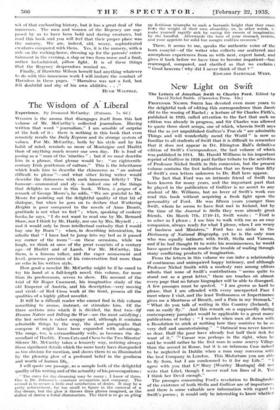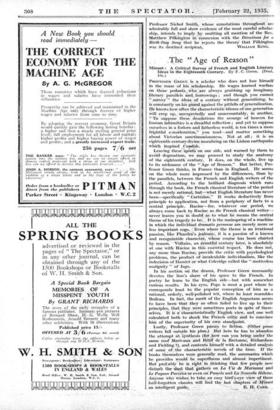New Light on Swift
PROFESSOR NICHOL Sarni has devoted even more years to the delightful task of editing this correspondence than Jacob
did to the wooing of Rachel ; a lecture of Sir Charles Firth's, published in 1920, called attention to the fact that such an edition was already in progress, and Sir Charles was allowed to quote three short scraps, one of which, wherein Swift says
that the as yet unpublished Gulliver's Tray els "are admirable Things and will wonderfully mend the World" is now so
familiar to all students of Swift that it is difficult to remember
that it does not appear in Dr. Elrington Ball's definitive edition of Swift's Correspondence, the last volume of which was published in 1914. Mr. Harold Williams in his important reprint of Gulliver in 1926 paid further tribute to the activities of Professor Nichol Smith in this connexion, but the present volume contains the first indication that no fewer than fifty of Swift's own letters unknown to Dr. Ball here appear:
The fact that Ford was an intimate friend of Swift :has been known for many years, and the important part that
he played in the publication of Gulliver is no secret to any
student of Mr. Williams, but no lover of Swift's work can read this book without acquiring a fresh light upon -the personality of Ford. He was fifteen years younger than
Swift, whom he seems to have first met in Ireland, but by the time of the Journal to Stella they were already great
friends. On March 7th, 1710-11, Swift wrote : "Ford is as sober as I please ; I use him to walk with me as an. easy companion, always ready for what I please, when lam weary of business and Ministers." Ford has no niche in the
Dictionary of National Biography, yet he is the only man who was equally intimate with Swift, Stella and Vanessa, and if he had thought fit to write his reminiscences, he would have spared the modern reader the trouble of wading through many conflicting products of imagination.
From the letters in this volume we can infer a relationship of •continuous and unimpaired happy intimacy, and- although Professor Nichol Smith with a modesty rare among editors
admits that none of Swift's contributions" seems quite to stand out as a great letter," there are touches oil almost
every page that no future biographer will be able to disregard. A few passages must be quoted. "I am grown so hard to please, that I' am offended With every unexpected Face I meet where I Visit, and the least Tediousness or Impertinence gives me a Shortness of Breath; and a Pain in my Stomack." "What do you talk of writing in this Country (Ireland), I
can as easily, fry." And this remark on a supposedly daring
contemporary liamph10 'would be applicable to a great many publications of today : "I wonder when men sit down With
a Resolution-to stick at -nothing how they contrive to be so
very dull and unentertaining." " Oatmeal was never known so dear, Half the poor have already lost half their itch for
want of it." " Caesar was perhaps in the right, when he said he would rather be the first man in some scurvy Village than -the second hi Mine, bid it is an infamous Case indeed
to be neglected in Dublin 'when a man may converse , with the best Company in 141)114PA.. This Misfortune yon are able
to fly. from, but I am condemned to it for my Life." "I agree with you that 4dY. Mary jWortley Montagu] did not write that Libel, though I never read ten lines of it. Yet I think her Devil enough." The passages concerning Ford's revelation to Bolingbroke of the existence of both Stella and Gulliver are of importance, and there is some valuable new information with regard to Swift's poems ; it would only be interesting tninithi Whether Professor Nichol Smith, whose annotations throughout are admirably full and show evidence of the most careful scholar- ship, intends; t.1? imply. by omitting all mention of the Rev. 'Matthew .Pilkitigton in Connexion with the Directions for a Birth:Day Song that he rejects the theory- that Pilkington



















































 Previous page
Previous page